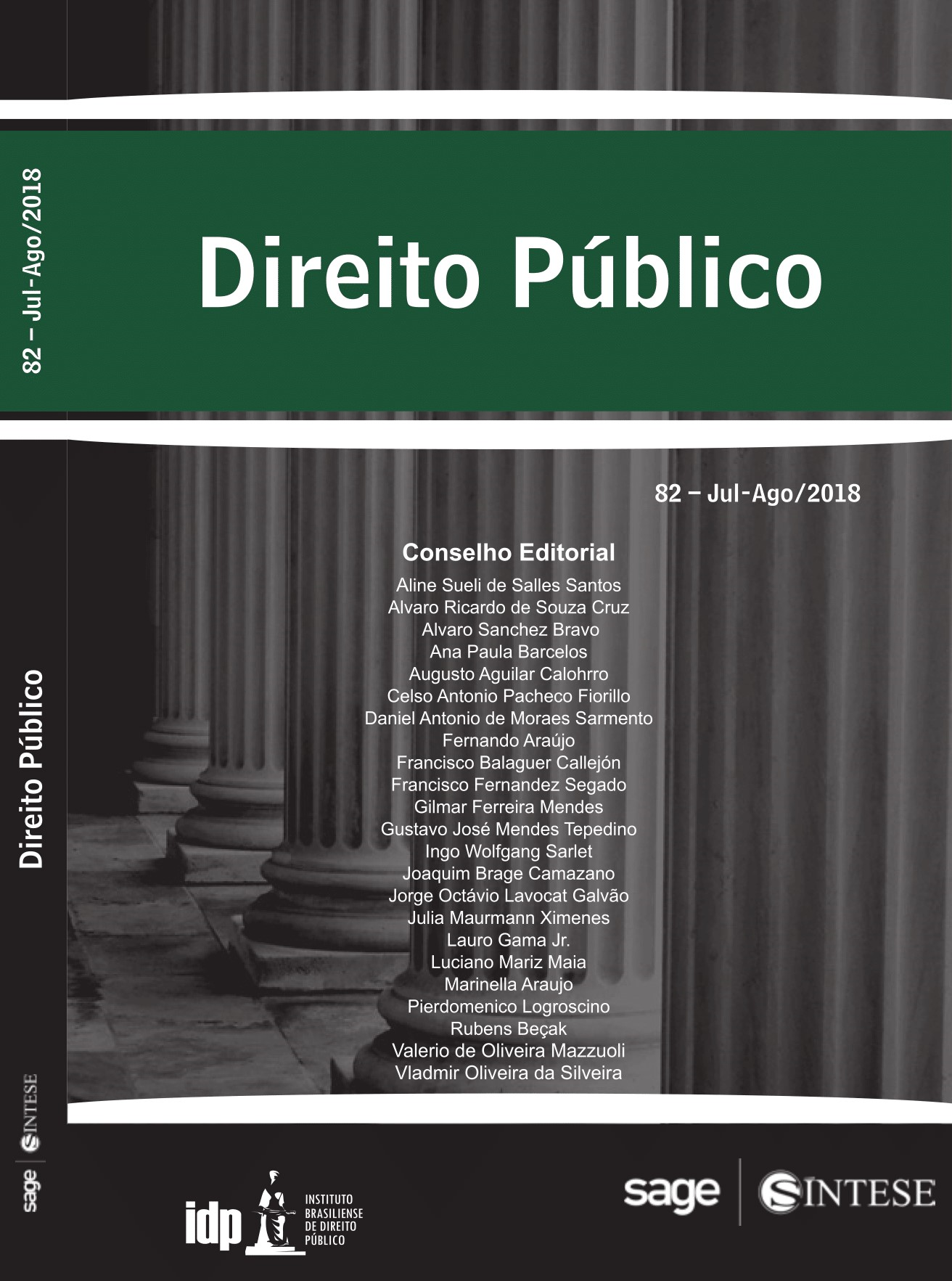EXPLICANDO DECISÕES: AS APLICAÇÕES DA ANÁLISE POR REGRESSÃO LOGÍSTICA (LOGIT) NO ESTUDO DO COMPORTAMENTO JUDICIAL
Keywords:
Palavras-chaves, Estudos empíricos em Direito, regressão logística, logit, comportamento judicialAbstract
Como testar empiricamente hipóteses baseadas na influência de variáveis sobre uma decisão entre duas alternativas? A literatura oferece para tanto a regressão logística (logit) como o método apropriado para conduzir a análise de dependência quando as variáveis dependentes são de natureza categórica discreta binária, ainda mais quando estas são resultado de um processo de escolha. Este artigo apresenta esta ferramenta relevante de pesquisa, dirigindo-se principalmente para o público de Direito, enfrentando detalhes como identificação de problemas de pesquisa, codificação das variáveis, interpretação dos resultados e revisão de casos em que foi aplicada.
Downloads
References
AMARAL-GARCIA, S. et al. (2009). Judicial Independence and Party Politics in the Kelsenian Constitutional Courts: The Case of Portugal. Cornell Law School and Wiley Periodicals, Inc. Journal of Empirical Legal Studies Volume 6, Issue 2, 381–404, June 2009.
BATISTELA, G. C. et al. (2009). Estudo sobre a evasão escolar usando regressão logística: análise dos alunos do curso de administração da Fundação Educacional de Ituverava. Tékhne ε Lógos, v.1, n.1.
BAUM, L. (2009). Judges and their audiences: A perspective on judicial behavior. Princeton University Press.
DEMARIS, A. (1992). Logit Modeling: Practical Applications. Newbury Park, SAGE.
EPSTEIN, L.; MARTIN, A. (2014). An introduction to empirical legal research. Oxford, Oxford University Press.
EPSTEIN, L. et al. (2013) The behavior of Federal Judges: a theoretical and empirical study of rational choice. Cambridge, Harvard University Press.
EVERITT, B. S. (2006). The Cambridge Dictionary of Statistics. Cambridge, Cambridge University Press.
FRANCISCO, P. M. S. B. et al. (2008). Medidas de associação em estudo transversal com delineamento complexo: razão de chances e razão de prevalência. Revista Brasileira de Epidemiologia, vol.11, n.3, pp. 347-355.
GILES, M. W. et al. (2006). Setting a Judicial Agenda: The Decision to Grant En Banc Review in the U.S. Courts of Appeals. Chicago, The Chicago University Press. The Journal of Politics, Vol. 68, No. 4 (Nov., 2006), pp. 852-866.
GILLMAN, H.; CLAYTON, C. W. (1999). Beyond Judicial Attitudes: Institutional approaches to Supreme Court Decision-Making. In: CLAYTON, C. W.; GILLMAN, H. (Ed.). Supreme Court Decision-Making: new institutionalist approaches. Chicago, University of Chicago Press.
GOMES NETO, J. M. W. (2015). Pretores Estratégicos: Por que o Judiciário decide a favor do Executivo e contra suas próprias decisões? Análise empírica dos Pedidos de Suspensão apresentados ao STF (1993-2012). Tese de Doutoramento. Recife, UFPE.
IARYCZOWER, M. et al. (2006). Judicial Lobbying: The Politics of Labor Law Constitutional Interpretation. American Political Science Review. Vol. 100, No. 1 February 2006.
LATTIN J. et al. (2011). Análise de dados multivariados. São Paulo, Cengage Learning.
LEVIN, J. et al. (2012). Estatística para ciências humanas. São Paulo, Pearson.
LEWIS-BECK, M. S. (1992). Series Editor’s Introduction. In: DEMARIS, A. (1992). Logit Modeling: Practical Applications. Newbury Park, SAGE.
LIMA, F.D.S. et al. (2016). Exploring the wonderful mystery of time: “lack of grounds” in constitutional judicial review as an evidence of passive virtues in Brazilian Supreme Court (STF). Paper presented at 24th IPSA World Congress of Political Science, Poznan, Poland.
PENG, C. J. et al. (2002). An introduction to logistic regression analysis and reporting. The Journal of Educational Research, vol.96, n.1, p.3-14.
POSNER, R. (2008). How judges think. Cambridge, Harvard University Press.
REZENDE, F. (2017). O Pluralismo Inferencial na Ciência Política Pós-KKV (2005-2015): Argumento e Evidências. Revista Política Hoje, 26(1), 241-278.
SUNSTEIN, C. R. et al. (2006). Are judges political? An empirical analysis of the Federal Judiciary. Washington DC, The Brookings Institution.
TAYLOR, M. M. (2008). Judging Policy: Courts and Policy Reform in Democratic Brazil. Stanford, Stanford University Press.
VANBERG, G. (2001). Legislative-Judicial Relations: A Game-Theoretic Approach to Constitutional Review. American Journal of Political Science, Vol. 45, No. 2 (Apr., 2001), pp. 346-361.
VIANNA, I. O. A. (2001). Metodologia do trabalho científico: um enfoque didático da produção científica. São Paulo, EPU.
WALTENBURG, E. N.; SWINFORD, B. (1999). Litigating federalism: the states before the U.S. Supreme Court. London, Greenwood Press.
Downloads
Published
How to Cite
Issue
Section
License
O(s)/A(s) autores(as) dos manuscritos submetidos concorda(m) com as regras a seguir:
1) Todos os autores e autoras participaram do trabalho, são responsáveis pelas ideias e conceitos nele emitidos e atestam sua conformidade com os princípios éticos exigidos.
2) Todos os autores e autoras concordam com a forma final do trabalho e em ceder os direitos para publicação nos canais de publicação da Escola de Direito do IDP.
3) Todos os autores e autoras informam que o manuscrito é de sua autoria e assumem a responsabilidade pelo trabalho, declarando que a obra a ser publicada não infringe quaisquer direitos de propriedade intelectual de terceiros.
3.1) Em caso de submissão simultânea, além da reprovação imediata do artigo e comunicação ao(s) respectivo(s) periódico(s), a Revista Direito Público se reserva o direito de não receber novas submissões de todos os autores implicados pelo prazo de 2 (dois) anos, contado a partir da data de ciência do fato.
4) Todos os autores e autoras autoriza(m) a edição de seu trabalho e cede(m) à Escola de Direito do IDP os direitos de autor para reproduzir, editar e publicar ou veicular o citado trabalho em qualquer forma midiática, resguardada a autoria, em particular sob forma digital, em arquivo eletrônico online na Internet, bem como armazená-los em seu repositório de acordo com o desenvolvimento do processo editorial. Esta concessão não terá caráter oneroso para a Escola de Direito do IDP, não havendo remuneração sob qualquer modalidade pela utilização do referido material, tendo este o caráter de colaboração científica.












